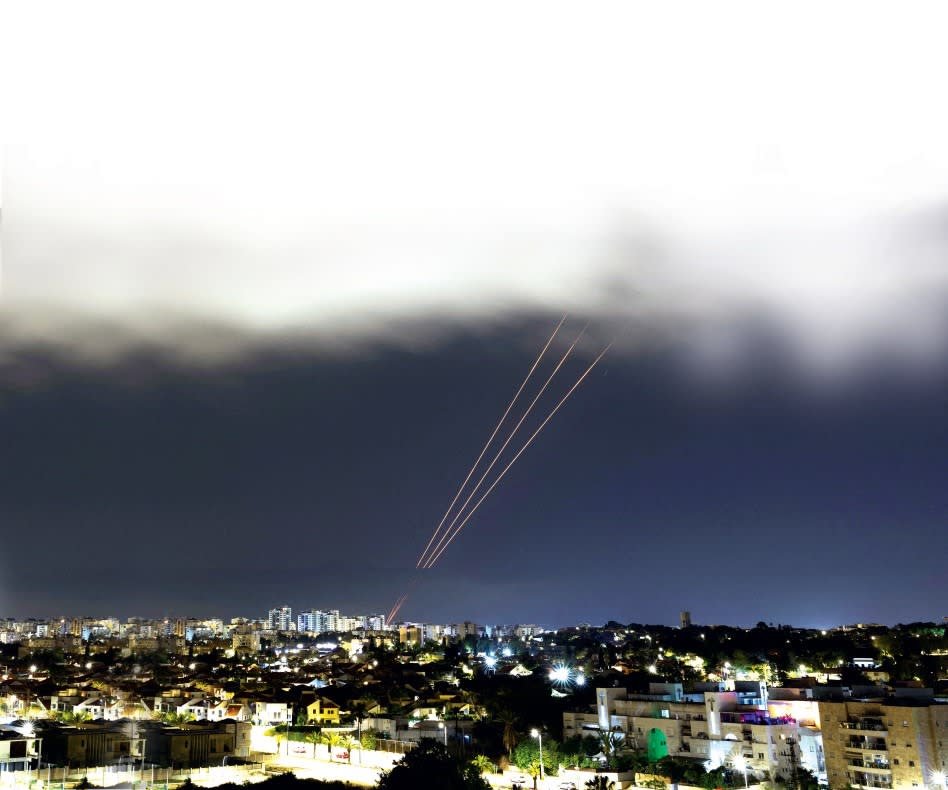Iranian attack shows Israel’s right-wing gov’t exudes weakness
Whoever planned the attack on the Iranian Isfahan International Airport did a thorough job. It was a surgical strike with pinpoint precision, demonstrating Israel’s capability to hit any point across Iran. The attack also used very precise intelligence regarding the MCM systems meant to protect Iran’s most crucial nuclear site in Natanz, a military base in Iran.
The attack zoned in on a target that would be interesting, challenging, and concerning in the eyes of Iranians but without causing significant damage, casualties, or public humiliation. The goal was to convey a precise message to the Iranians without completely belittling them, forcing them to react, or taking unnecessary risks.
The positive outcome of the Iranian attack on Israel is the IDF’s display of its full capabilities, which shielded the country against 500 missiles and drones. These accomplishments can be compared to the non-existent Iranian defense capabilities.
The Iranian attack failed to breach the Israeli defense system with 500 projectiles, in contrast with Israel’s sleek attack, which penetrated the Iranian defense with just a few.
Despite these positive aspects, last Shabbat, Iran made it clear to the whole world that it is no longer willing to hold back. The era of Israeli deterrence has ended. Iran dared to launch over 100 ballistic missiles toward Israel, as well as a significant number of cruise missiles and armed drones. The fact that Iran is still standing says a lot. According to recent reports, Israel responded minimally in order not to disturb the ‘peace’ and to avoid an Iranian counterreaction. This is the behavior of a frightened country.

One could have praised the Netanyahu-Ben-Gvir-Gantz government for its pragmatism, its distance from adventurism, and its measured response. One could also assume that what Netanyahu would say about all this if he were the opposition leader and not the prime minister would be the complete opposite.
Perhaps something along the lines of, “The Bennett-Lapid government has once again proven its weakness and defeat. The Muslim Brotherhood has brought Israel to a resounding defeat in which it barely responds to a wrongful attack of hundreds of missiles on Israeli cities! As I have warned in the past, when terror smells weakness, it raises its head. When the ayatollah regime understood that it had business with the Muslim Brotherhood, it launched a blatant attack on Israel. We must save the country from this government before it is too late.”
Such things were said in the past about much less than 500 missiles being fired at Israel simultaneously from Iran, Yemen, and Lebanon. Furthermore, it is important to remember that during the period of the Netanyahu-Lapid government, Iran suffered severe blows in its territory, much more than the one between Thursday and Friday last week. Additionally, senior members of the revolutionary guards were captured and investigated inside Iran, confessed to Iran’s criminal plans, and were released.
All of this was done by the previous government, according to foreign publications. Quietly, modestly, without headlines, and without an attack of hundreds of Iranian missiles. According to this comparison, the right-wing government showed that it is, in fact, the true left-wing Muslim Brotherhood government.
Political sabotage within the government
Who said that Itamar Ben-Gvir and Bezalel Smotrich are not coordinated? Despite their rivalry, slander, and animosity, they are completely coordinated in truly important matters, such as causing as much damage as possible in as little time to the State of Israel, which pays their salaries.
After the assassination of the Iranian general Soleimani in Damascus, the only one who dared to express and take implied responsibility for the event was Israel’s Minister of Finance Bezalel Smotrich, who tweeted a tweet with only one emoji: a green “V” sign.
After the mysterious nighttime attack in the area of Isfahan, attributed to Israel, the only one who dared to hint at some kind of partial responsibility for the event was National Security Minister Itamar Ben-Gvir, who tweeted a single-word tweet: “Dardele” (slang for ‘pathetic’)
Benjamin Netanyahu entrusted the country’s most important assets—the treasury and national security—to these two. They should focus on this aspect alone.
The fact that two senior ministers from the government are acting against it in a ministerial sabotage during wartime is incomprehensible. One violates the policy of restraint, which is supposed to allow the Iranians to move on and not react, while the other belittles and undermines the retaliation attributed to Israel in a way that also forces the Iranians themselves to quote it in their networks in Tehran. If this weren’t our country, we would also be laughing at us.
If there were a proper, responsible, and functioning prime minister here, he would have fired both of them long ago. Sharon would have done that. Rabin would have done that. Olmert would have done that. Everyone would have done that. The man only has an impressive record in eliminating rivals. Not to mention that these are not political rivals but rivals causing harm to the security of Israel.
This column was written even before knowing for sure what was attacked in the Isfahan area at 3:30 in the morning and in what way. What is known is that Israel is enveloped in silence, meaning it very much wants to continue, and Iran is also behaving politely, almost ignoring the event.
Since the Iranian attack over a week ago, Israel had planned an attack against Iran at least twice. These threats were probably more significant than the one carried out in the end. The first time was on a Saturday night during the Iranian attack.
The intention, according to estimates, was to take advantage of the turmoil to severely damage Iran. The advantage of such an attack would have been the small chance of dragging the sides into war. But it didn’t work out, mostly for logistical and operational reasons.

According to the Wall Street Journal, the second time was the night after the Iranian attack. It seemed inevitable that there would be an Israeli attack. Israel then dealt with a barrage of threats, promises, proposals, ideas, and recommendations from all its allies in the Middle East and beyond to neutralize the Iranian attack to achieve strategic goals more important than the balance of power between the countries.
At the end of the day, what was put into action, according to foreign reports, was an inclusion that allowed Israel to check ‘done’ on its response column. It also helped steer the Iranian attack towards more significant moves in the field of sanctions on Iran and the regional air defense alliance.
A hint to what was expected could have been received when various senior figures from the ultra-Orthodox world, led by Arye Deri, made statements that Israel needs to display strength but not necessarily attack. For those who don’t understand Netanyahu’s method, this was a softening attack. Here, the ultra-Orthodox think one should restrain oneself and then, within less than 24 hours, respond with loud words.

The long-term effects of the Israel-Iran conflict
In the balance between Israel and Iran, there is currently a stalemate: Israel has proven that it is protected from Iranian ballistic attacks, and Iran has been exposed as completely vulnerable to Israeli aerial attacks. On the other hand, Iran has proven that it is no longer deterred by Israel by daring to attack Israeli territory with maximum force, while Israel emphasizes that it is indeed deterred by Iran, as it opted for the most minor response.
To this, two more Israeli intelligence assessments need to be added: the first assessment is that Iran would not respond to the assassination of the general in Damascus. The second assessment, after it was already clear that Iran would respond, was about the intensity of the Iranian response, which was much stronger.
The response to Iran reminded me of the event between September 6 and 7, 2007. Back then, it was also between Thursday and Friday. Israeli Air Force planes attacked a mysterious target in Syria, destroyed it, and disappeared. Israel enveloped itself in absolute silence. No one tweeted, no one reacted, and ministers received instructions not to leave their homes to avoid encountering a news camera by chance.
The effort was to allow Syrian President Bashar al-Assad to deny that anything happened, wipe away the evidence, and move forward. The fear was of an immediate all-out war through the launch of thousands of Syrian missiles toward strategic targets in Israel.
A few days later, the silence was broken. It was opposition leader Benjamin Netanyahu, in an interview with Yaakov Eilon on Channel 2. Netanyahu was asked by Eilon about the mysterious attack and shockingly declared that as opposition leader, he was briefed and supported the government (which contradicted his previous statements).
Perhaps this is why Netanyahu has not updated opposition leader Yair Lapid in the past two months. Either way, the truly worrying news today is not in Iran but the decision of the international credit rating agency S&P to downgrade Israel’s credit rating. Now, it’s already a well-established trend. Israel is rapidly declining. The world has lost trust in its economy and leadership.

This is a particularly worrying event because it will cost us billions in interest and debt repayments. Additionally, the chaotic police transformation gave the initial push to this snowball, which could bury us all. The cost of insurance and the risk premium for Israeli debt have jumped to 76%—a number we haven’t seen in years.
But that was just the beginning. After October 7 and the government’s reckless conduct (coalitional funds, budget, etc.), it has already jumped to 176%. Today, we are paying interest rates on the scale of third-world countries. This will cost our children and grandchildren tens of billions of dollars.





Comments are closed.